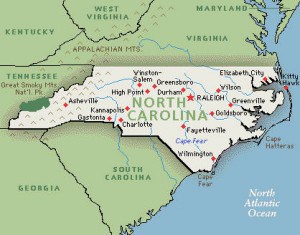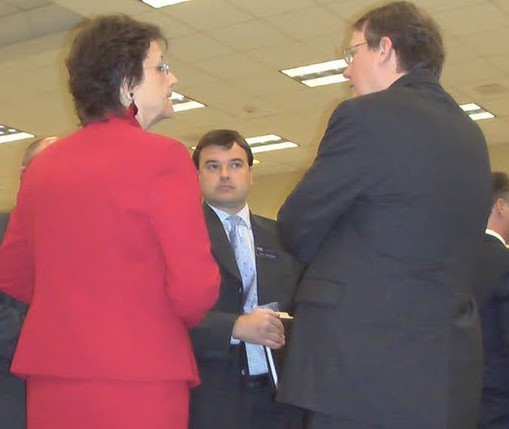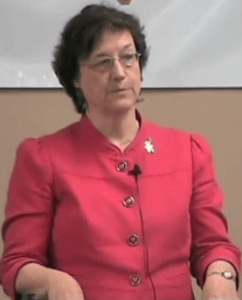
Rep. Avila (left) with Time Warner Cable's top lobbyist (right, back turned). Photo by: Bob Sepe of Action Audits
Rep. Marilyn Avila (R-Time Warner Cable) is living up to her much-deserved reputation as a shill for North Carolina’s largest cable company as she continues her campaign to wreak havoc on community-owned broadband networks and services.
Well-placed sources tell Stop the Cap! either Avila has an evil twin running around impersonating her, or she is saying one thing to a public audience while doing something completely different in private.
In a closely coordinated effort with the state’s top cable lobbyists, Avila met last Friday to negotiate promised protections for existing community-owned broadband networks that would otherwise be destroyed by her bill, H129, written by the state’s Big Telecom companies.
Both Reps. Avila and Julia Howard told us their word was their bond. “The last thing that we want to do as a state is to harm one of our cities after they entered into the business,” Avila said to members of the Public Utilities Committee.
Howard expanded on her own promise: “The objective is to protect the cities that have already gone into the business. It is our intent to carve out these cities and hold them harmless. My word is my bond, and I don’t hear anybody snickering. But when I say it I mean it, as the senior chair of finance, that is my pledge. Before it heads into finance there will be a PCS that is satisfactory to everybody.”
Apparently those bonds were issued by Lehman Brothers, because they have lost all of their value to the people of North Carolina. Nobody feels like snickering over such a serious betrayal of trust, especially when Howard’s definition of “everybody” is limited to lobbyists for the telecommunications industry. Your consumer needs are irrelevant.
Last Friday’s meeting was once again a stage play from Time Warner Cable and their sidekick, the much-smaller CenturyLink. After the cable company laid down the law to a stunned audience of representatives from communities across the state, fooled into thinking they were there to discuss an honest compromise, things went from bad to worse.
“It literally got down to the point where the cable company was dictating terms about what cities can and cannot do with their networks, even discussing which streets the networks would be allowed to serve,” our source tells us.
Avila’s stubborn streak was on full display, as she rejected proposal after proposal.
What about public private partnerships with full exemptions for pre-existing networks?
Not on Big Telecom’s approved list, so rejected out of hand, even after offering that she agreed with the concept. Her reasoning? She wants to go with her original bill.
The result of the one-sided discussion was two pages of legislative word jumbling in the form of a substitute amendment. The word salad delivers substantially no real change to Avila’s original bill. It contains virtually all of the same onerous provisions guaranteed to destroy community broadband networks, taking the state’s reputation for being a good credit risk with it. It also delivers red meat to an industry meme “community broadband networks are business failures.” Now you know why.
We predict Avila will use the farcical affair to claim her substitute amendment was the product of a “hard-fought compromise” with cities and providers.
In fact, it represents nothing more than a shameful broken promise to the citizens of North Carolina. Their interests are completely secondary to Avila and her legislative allies, willing to listen to a telecommunications industry prepared to hand out campaign contributions to enact their agenda.
The collateral damage of Avila’s struggle to eliminate better broadband and keep competition to a bare minimum cannot even be measured yet. Should Avila’s bill become law, the clear message sent to would-be entrepreneurs is that North Carolina values their cable and phone companies over the needs of entrepreneurs contemplating the next generation of digital economy businesses. Ms. Avila’s message to them, and to residents who want better broadband: live with what you’re getting from my friends or go without.
Many will choose a third option — avoiding setting up shop in a state where a handful of providers maintain a comfortable duopoly delivering the least amount of service for the highest possible price.


 Subscribe
Subscribe





